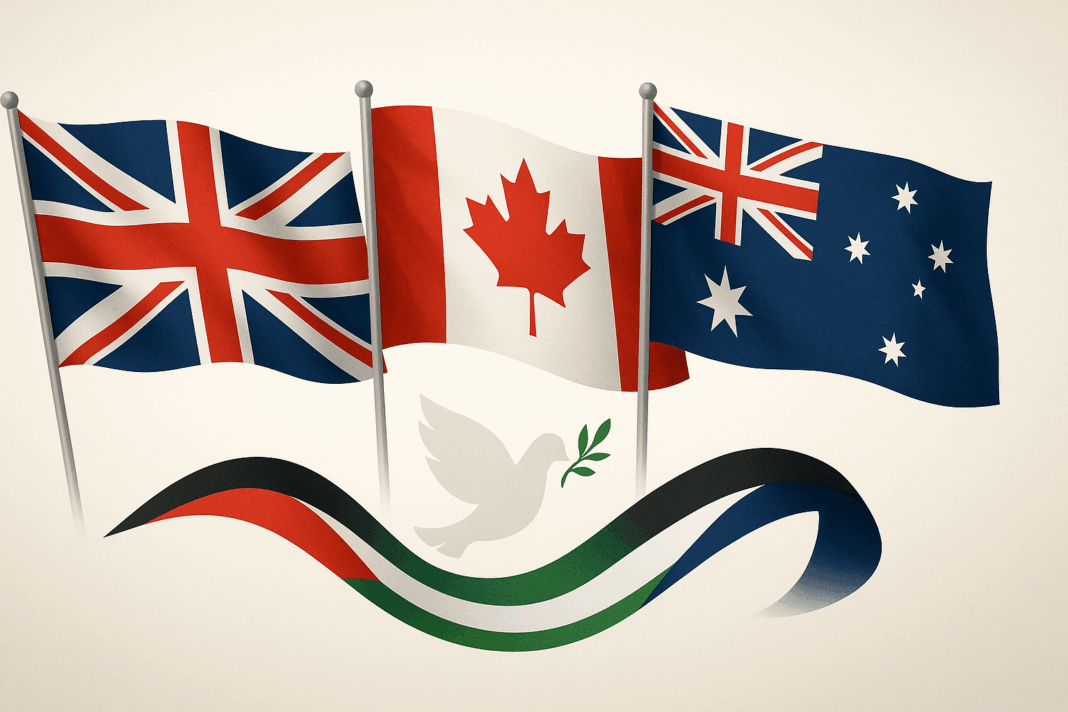Britain, Canada and Australia formally recognized a Palestinian state on Sunday, a coordinated step their governments presented as a push to resuscitate a two-state solution in the context of Israel’s ongoing war in Gaza. The statements are a break with Washington and place three U.S. allies near at hand among over 140 states that already grant recognition.
British Prime Minister Keir Starmer announced the U.K. had acted “to keep alive the possibility of peace and a two-state solution,” and the action was not a reward to militants. “Today, to rekindle the hope of peace for the Palestinians and Israelis, the United Kingdom formally recognises the State of Palestine,” Starmer announced in a video message.
Ottawa later released a statement by Prime Minister Mark Carney: “Canada recognizes the State of Palestine and extends our partnership towards realizing the promise of a future of peace for both the State of Palestine and the State of Israel.”
Australian Prime Minister Anthony Albanese release a statement shortly after formally recognizing “the independent and sovereign State of Palestine.” The announcement was made on Sunday, September 21, 2025, in a joint statement with Foreign Minister Penny Wong. It declared:
“Effective today, Sunday the 21st of September 2025, the Commonwealth of Australia formally recognises the independent and sovereign state of Palestine.”
This move was part of a coordinated international effort alongside Canada and the United Kingdom to revive momentum for a two-state solution amid the ongoing humanitarian crisis in Gaza B C D. The statement emphasized that Hamas must have no role in Palestine and outlined expectations for democratic reforms by the Palestinian Authority
Portugal trailed behind, with Foreign Minister Paulo Rangel making official recognition in New York ahead of this week’s U.N. General Assembly. France signaled it will follow suit shortly, representing how quickly diplomatic terrain is changing.
Israel denounced the moves. Prime Minister Benjamin Netanyahu stated recognition is a “prize” for Hamas and pledged that a Palestinian state “will not happen” west of the Jordan River. Israel’s Foreign Ministry stated the action rewards terrorism and jeopardizes prospects for peace.
The Trump administration opposes the Sunday recognitions. President Donald Trump publicly disagreed with the U.K. proposal last week during his trip to Britain, and Washington has demanded statehood to come only through direct negotiations.
Palestinian leaders welcomed the announcements with open arms. Foreign Minister Varsen Aghabekian Shahin greeted recognition as “irreversible step” that preserves the two-state option and brings independence closer, and asserting the need for continued pressure to end the war and expand humanitarian access.
The news arrives as the human toll in Gaza continues to rise. A U.N. probe last week concluded that Israel “has committed genocide” there—findings Israel forcefully rejected as politicized and biased. Human rights groups have reported widespread devastation and large-scale displacement, with Reuters citing more than 65,000 Palestinians dead since the outbreak of war, figures disputed by Israel.
For Britain, the step has historical resonance. London had ruled Mandate Palestine after World War I and made the 1917 Balfour Declaration, in which it pledged support for the establishment of a national home for the Jewish people. Starmer said Sunday’s move is to help achieve “a future of security and dignity for both peoples” and to resume diplomacy on clear terms: the end of major hostilities, ongoing humanitarian access and a return to the negotiations.
Subsequent measures will hinge on whether or not recognition is followed by policy. European and Commonwealth capitals are debating follow-on measures—from sanctions against violent actors to support for Palestinian Authority reforms and security guarantees to Israel. In New York this week, attention will turn to Netanyahu and other leaders’ addresses, and to how many more states make official recognition on the U.N. stage.
Advocates for Sunday’s step claim it revives leverage and prevents the two-state concept from disappearing into history. Others respond that recognition, without a cease-fire and a credible political plan, threatens symbolism without relief. For families in Gaza and Israelis who remain in waiting for hostages to return home, the measure is whether now diplomacy yields concrete change on the ground.
A global media for the latest news, entertainment, music fashion, and more.














